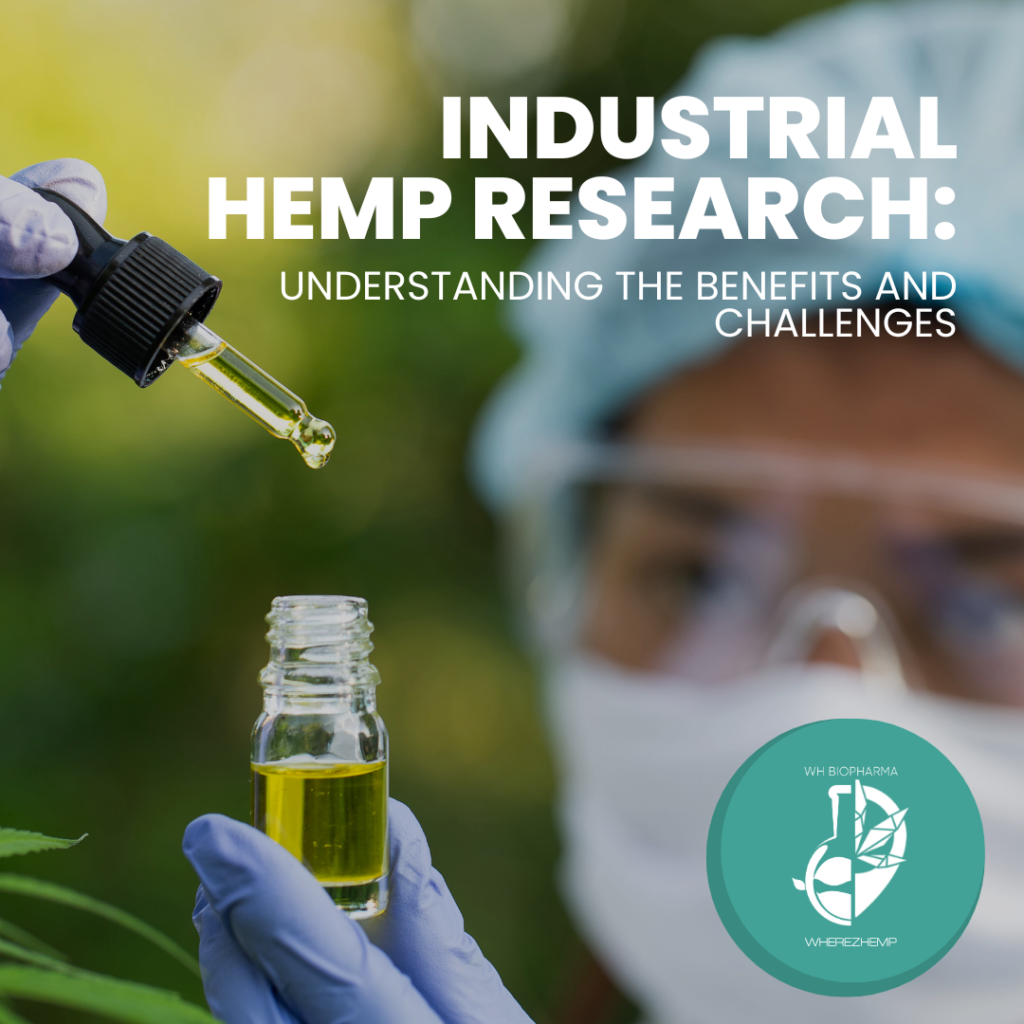With the legalization of industrial hemp under the 2018 Farm Bill, hemp producers are now eligible for several USDA programs. However, there are certain regulations and requirements that licensed hemp producers must follow to participate in these programs.
The first requirement for participating in USDA hemp programs is obtaining a hemp production license from an approved state or tribe. Licensed hemp producers must provide their license number to the USDA and comply with all other state or tribe, and federal regulations for the production of hemp.
Once licensed, hemp producers can participate in several USDA programs, including the Environmental Quality Incentives Program (EQIP), the Regional Conservation Partnership Program (RCPP), and the Conservation Stewardship Program (CSP). These programs provide financial and technical assistance to help hemp producers improve soil health, water quality, and wildlife habitat.
The Natural Resources Conservation Service (NRCS) and Farm Service Agency (FSA) are the two agencies responsible for implementing these programs. The NRCS provides technical assistance to hemp producers to develop conservation plans and farm programs that promote sustainable farming practices. The FSA provides financial assistance to eligible hemp producers through various farm programs.
In addition to these programs, hemp producers can also participate in the USDA Hemp Production Program. This program provides regulations for the production of hemp, including testing and sampling requirements, as well as requirements for the disposal of plants that exceed the allowable THC level. The USDA’s Risk Management Agency also offers crop insurance to hemp producers to help manage risk associated with the production of hemp.
Beginning farmers who are interested in hemp production may also be eligible for USDA programs, including the EQIP and CSP. These programs provide additional assistance to help beginning farmers develop and implement conservation plans that promote sustainable farming practices.
It is important to note that licensed hemp producers must comply with additional requirements for participating in USDA programs. These requirements include submitting plans to the USDA outlining the production of hemp, reporting acreage and other production information, and complying with all applicable laws and regulations related to controlled substances.
With the passage of the 2018 Farm Bill, hemp producers are now eligible for several USDA programs. However, licensed hemp producers must comply with all state and federal regulations for the production of hemp and meet additional requirements for participating in USDA programs. By participating in these programs, hemp producers can receive financial and technical assistance to help promote sustainable farming practices and improve the overall quality of their hemp crops.
USDA Hemp Production Program: Regulations and Requirements for Licensed Hemp Producers
With the legalization of industrial hemp under the 2018 Farm Bill, the USDA established the Domestic Hemp Production Program to provide regulations and requirements for the production of hemp. The program aims to ensure that hemp is produced safely and consistently while adhering to federal regulations.
To participate in the USDA Hemp Production Program, licensed hemp producers must submit plans to the USDA outlining their production of hemp. These plans must include information on land use, testing and sampling protocols, disposal of non-compliant plants, and compliance with all applicable laws and regulations related to controlled substances.

Licensed hemp producers must also comply with all state and federal regulations for the production of hemp. This includes obtaining a hemp production license from an approved state or tribe, submitting their hemp production license and number to the USDA, and complying with all state and federal regulations related to the production of hemp.
The USDA Hemp Production Program provides regulations for the production of hemp, including testing and sampling requirements to ensure that hemp does not contain more than 0.3% THC. Licensed hemp producers must conduct pre-harvest testing to determine the THC level of their plants and must dispose of plants that exceed the allowable THC level.
The program also provides regulations for the disposal of non-compliant plants, which must be destroyed in accordance with state and tribal laws. Additionally, licensed hemp producers must maintain records of all hemp production activities, including the disposal of non-compliant plants.
The USDA’s Risk Management Agency also offers crop insurance to licensed hemp producers to help manage risk associated with the production of hemp. This program provides coverage for loss of yield or revenue due to natural disasters or other unforeseen circumstances.
In addition to the Hemp Production Program, licensed hemp producers may also be eligible for other USDA programs, including the Environmental Quality Incentives Program (EQIP), the Regional Conservation Partnership Program (RCPP), and the Conservation Stewardship Program (CSP). These programs provide financial and technical assistance to help hemp producers improve soil health, water quality, and wildlife habitat.
The Natural Resources Conservation Service (NRCS) and Farm Service Agency (FSA) are the two agencies responsible for implementing these programs. The NRCS provides technical assistance to licensed hemp producers to develop conservation plans that promote sustainable farming practices. The FSA provides financial assistance to eligible hemp producers through various farm programs.
The USDA Hemp Production Program provides regulations and requirements for licensed hemp producers to ensure that hemp is produced safely and consistently while adhering to federal regulations. Licensed hemp producers must comply with all state and federal regulations related to the production of hemp and meet additional requirements for participating in USDA programs. By participating in these programs, hemp producers can receive financial and technical assistance to help promote sustainable farming practices and improve the overall quality of their hemp crops.
Industrial Hemp Research: Understanding the Benefits and Challenges
Industrial hemp is a versatile crop that has the potential to provide a wide range of benefits, including fiber and textile production, food and nutritional supplements, biofuels, and more. As a result, many countries and organizations have launched industrial hemp research programs to study the crop’s potential uses and benefits.

Benefits of Industrial Hemp Research
One of the most significant benefits of industrial hemp research is that it can help us better understand the potential uses and benefits of this versatile crop. For example, research has shown that hemp fiber can be used to create biodegradable plastics, which can help reduce our reliance on traditional, non-biodegradable plastics.
Research has also shown that hemp seeds are rich in protein, vitamins, and minerals, making them a potential source of nutrition for both humans and animals. Additionally, hemp seeds are high in essential fatty acids, which have been linked to a variety of health benefits, including improved heart health and brain function.
Another potential benefit of industrial hemp research is that it could lead to the development of new, sustainable agricultural practices. For example, hemp requires fewer pesticides and fertilizers than many other crops, making it a potentially more sustainable option for farmers.
Challenges of Industrial Hemp Research
Despite its potential benefits, industrial hemp research also faces several challenges. One of the main challenges is the lack of funding for research programs. Many countries and organizations are still hesitant to invest in industrial hemp research due to its association with cannabis, which remains a controlled substance in many parts of the world.
Another challenge facing industrial hemp industry and research is the lack of standardization in regulations governing the crop. In some areas, regulations around the cultivation and processing of industrial hemp can be complex and inconsistent, which can create barriers to research and development.
Additionally, there is a need for more research into the potential environmental impacts of industrial hemp cultivation. While hemp has been touted as a potentially more sustainable crop than many others, more research is needed to fully understand its impact on soil health, water quality, and other environmental factors.
Industrial hemp research has the potential to provide numerous benefits, including new sources of nutrition, sustainable agricultural practices, and more. However, it also faces several challenges, including funding and regulatory barriers, as well as a need for more research into environmental impacts. By addressing these challenges, we can continue to unlock the potential of this versatile crop and explore new ways to use it for the benefit of society and the environment.
USDA Outlines Plans for Hemp Production
In 2018, the U.S. Congress passed the Agriculture Improvement Act, commonly known as the 2018 Farm Bill, which legalized the production of industrial hemp at the federal level. Since then, the U.S. Department of Agriculture (USDA) has been working to develop regulations for hemp production and establish a domestic hemp and seed production program.
As part of this effort, the USDA’s Agricultural Marketing Service (AMS) has outlined the process by which states and tribes can submit plans that enable licensed hemp producers to grow hemp in those areas. Here’s what you need to know.
Submitting a Hemp Production Plan
Under the USDA’s domestic hemp production program, states and tribes can submit plans that outline their regulations for hemp production, including licensing requirements, testing standards, and enforcement procedures. The USDA will review these plans to ensure they meet the program’s requirements, including the following:
- The plan must include a procedure for testing hemp plants to ensure they contain no more than 0.3% THC, the psychoactive compound found in cannabis.
- The plan must include a procedure for disposing of non-compliant plants, which are plants that contain more than 0.3% THC.
- The plan must include procedures for conducting annual inspections of hemp producers to ensure compliance with the plan’s requirements.
- The plan must require hemp producers to obtain licenses from the state or tribe and provide their license number to the USDA.
Once a state or tribe’s plan is approved by the USDA, licensed hemp producers in that area can legally grow hemp in compliance with the department of agriculture plan’s regulations.
Benefits of the Domestic Hemp Production Program
The USDA’s domestic hemp production program provides several benefits for licensed hemp producers and the hemp industry as a whole. By establishing a federal framework for hemp production, the program helps ensure that hemp producers in different states and tribes are subject to consistent regulations and testing standards, which can help increase the quality and safety of hemp products.
The program also enables hemp producers to access a range of USDA programs, including the Environmental Quality Incentives Program, the Regional Conservation Partnership Program, and the Conservation Stewardship Program, which provide financial and technical assistance for sustainable farming practices.
In addition, the program provides greater certainty for hemp producers by establishing a clear legal framework for hemp production at the federal level. This can help encourage investment and innovation in the hemp industry, which has the potential to provide significant economic benefits for rural communities.
The USDA’s domestic hemp production program provides a clear path for states and tribes to establish regulations for hemp production and enable licensed hemp producers to legally grow hemp in those areas. By providing consistent testing standards and regulatory oversight, the program can help increase the quality and safety of hemp products and provide greater certainty for hemp producers. As the hemp industry continues to grow and evolve, the the hemp program will play a critical role in supporting sustainable hemp production and promoting economic development in rural communities.





